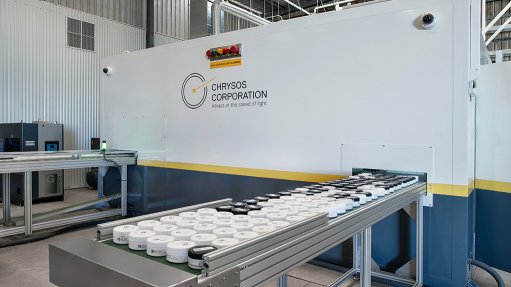British Columbia unable to support Kinder Morgan’s Trans Mountain Expansion
TORONTO (miningweekly.com) – The British Columbia (BC) provincial government has stressed that it cannot support Kinder Morgan’s Trans Mountain Expansion project based on information submitted to the National Energy Board (NEB) panel reviewing the project.
The provincial government stated on Monday that, during the course of the NEB review, the company had not provided enough information around its proposed spill prevention and response for the province to determine if it would use a world-leading spills regime.
Because of this, the province said it was unable to support the project at this time, based on the evidence submitted.
"Trans Mountain is confident that through continued discussions with the province – along with the final steps of the NEB process that already include 150 draft conditions that the company must meet – it will be able to satisfy BC’s five conditions by the time the regulatory process is complete," Trans Mountain said in an emailed statement, noting that several of the province's conditions required multiple parties to come to the table and work together.
The BC government has made a final written submission to the NEB panel, insisting that it would only continue to consider evaluating the project based on the company’s ability to meet five previously established requirements.
In preparing the final argument submission, the provincial government’s legal and technical experts analysed the information contained in Trans Mountain’s application and all of the submissions made to the review panel. It had also filed three sets of detailed information requests pertaining to spill response, prevention and recovery systems.
Trans Mountain filed its final argument with the NEB in December, comprising a summary of the many thousands of pages of evidence presented and the culmination of more than three years of environmental and technical studies, engineering and design work, as well as engagement with communities, stakeholders, landowners and Aboriginal groups; it also became a part of the regulatory process that had been under way since 2013.
MARKET ACCESS
In operation since 1953, the Trans Mountain pipeline system (TMPL) had, to date, been the only pipeline system in North America that transported both crude oil and refined products to the west coast. The TMPL moves product from Edmonton, Alberta, to marketing terminals and refineries in the central BC region, the Greater Vancouver area and the Puget Sound area, in Washington state, as well as to other markets such as California, the US Gulf Coast and overseas through the Westridge marine terminal, located in Burnaby, British Columbia. Only crude oil and condensates are shipped into the US. NYSE-listed Kinder Morgan is the largest energy infrastructure company in North America.
Trans Mountain has proposed an expansion of this existing 1 150 km pipeline between Strathcona County (near Edmonton), Alberta and Burnaby. The proposed expansion, if approved, would create a twinned pipeline that would increase the nominal capacity of the system from 300 000 bbl/d, to 890 000 bbl/d.
Canada remains the most important crude supplier to the US, which is unlikely to change in the foreseeable future. However, Canadian producers receive a discount to the American benchmarked oil price, owing to the industry's lack of access to global markets. The West Texas Intermediate crude benchmark fell below $32/bl on Monday morning for the first time since 2003, amid fears about a worse-than-expected slowdown in China.
Canada's Athabasca oil sands are large deposits of bitumen, or extremely heavy, tarry crude oil, located in north-eastern Alberta, roughly centred on the boomtown of Fort McMurray. Canada holds the world’s third-largest oil reserves.
Nevertheless, it is imperative to move more energy east in Canada, as well as more energy offshore to the north, through hazardous Arctic waters, or to the west coast, which is complicated for environmental reasons.
With this in mind, energy giant Enbridge has proposed to increase oil transportation capacity through projects including the C$6-billion Northern Gateway pipelines from Alberta to Canada’s Pacific Coast. Another project proposed by Enbridge is a new west-east pipeline within Canada that would send about 800 000 bbl/d of diluted bitumen from Alberta to refineries in Quebec and on Canada’s East Coast, most likely to Irving Oil’s massive Saint John refinery, in New Brunswick – the largest in Canada and one of the ten biggest oil refineries in North America.
Canadian oil producers are also considering a pipeline north to the Arctic Ocean, seemingly hoping that the emerging ice-free shipping routes could be a path to get more crude to market. To that extent, Alberta previously hired a consulting firm, Canatec Associates International, to study the feasibility of a pipeline to Tuktoyaktuk, in the Northwest Territories.
In 2012, the BC provincial government established five requirements for the provincial government to consider the construction and operation of heavy-oil pipelines in the province.
These requirements entailed:
- The successful completion of the environmental review process. For the Trans Mountain Expansion project, that would mean a recommendation by the NEB review panel that the project proceed;
- A world-leading marine oil spill response, as well as the implementation of recovery and prevention systems for BC's coastline and ocean to manage and mitigate the risks and costs of heavy-oil pipelines and shipments;
- The implementation of world-leading practices for land oil-spill prevention, as well as response and recovery systems to manage and mitigate the risks and costs of heavy-oil pipelines;
- The address of legal requirements regarding Aboriginal and treaty rights and the provision of opportunities for First Nations, as well as the information and resources necessary to participate in and benefit from a heavy-oil project; and
- The assurance that BC receive a fair share of the fiscal and economic benefits of a proposed heavy-oil project that reflects the level, degree and nature of the risk borne by the province, the environment and taxpayers.
Comments
Press Office
Announcements
What's On
Subscribe to improve your user experience...
Option 1 (equivalent of R125 a month):
Receive a weekly copy of Creamer Media's Engineering News & Mining Weekly magazine
(print copy for those in South Africa and e-magazine for those outside of South Africa)
Receive daily email newsletters
Access to full search results
Access archive of magazine back copies
Access to Projects in Progress
Access to ONE Research Report of your choice in PDF format
Option 2 (equivalent of R375 a month):
All benefits from Option 1
PLUS
Access to Creamer Media's Research Channel Africa for ALL Research Reports, in PDF format, on various industrial and mining sectors
including Electricity; Water; Energy Transition; Hydrogen; Roads, Rail and Ports; Coal; Gold; Platinum; Battery Metals; etc.
Already a subscriber?
Forgotten your password?
Receive weekly copy of Creamer Media's Engineering News & Mining Weekly magazine (print copy for those in South Africa and e-magazine for those outside of South Africa)
➕
Recieve daily email newsletters
➕
Access to full search results
➕
Access archive of magazine back copies
➕
Access to Projects in Progress
➕
Access to ONE Research Report of your choice in PDF format
RESEARCH CHANNEL AFRICA
R4500 (equivalent of R375 a month)
SUBSCRIBEAll benefits from Option 1
➕
Access to Creamer Media's Research Channel Africa for ALL Research Reports on various industrial and mining sectors, in PDF format, including on:
Electricity
➕
Water
➕
Energy Transition
➕
Hydrogen
➕
Roads, Rail and Ports
➕
Coal
➕
Gold
➕
Platinum
➕
Battery Metals
➕
etc.
Receive all benefits from Option 1 or Option 2 delivered to numerous people at your company
➕
Multiple User names and Passwords for simultaneous log-ins
➕
Intranet integration access to all in your organisation




















